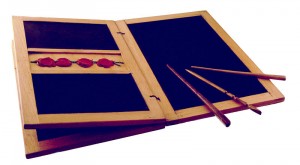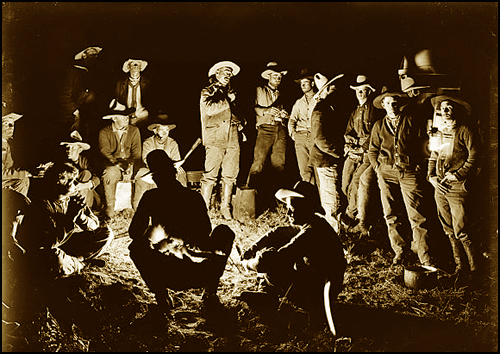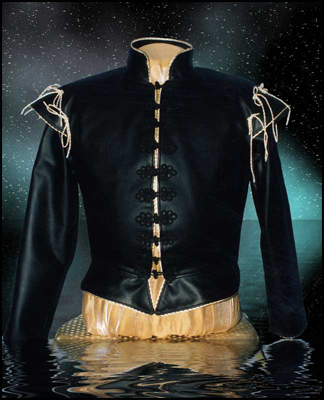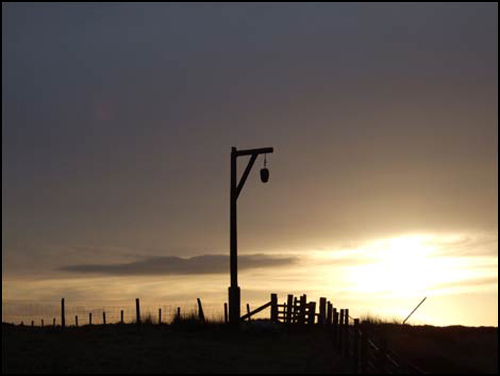Just as an irritant to those who think this site is afflicted with too much Tolkien content already, it’s worth mentioning that, all due respect for “Black Vulmea’s Vengeance” notwithstanding, the most unforgettable modern appearance of the word “gibbet” is in Chapter Ten of The Two Towers, “The Voice of Saruman.” On the front steps of the tower of Orthanc Gandalf, accompanied by Théoden, Éomer, Aragorn, Legolas, and Gimli, summons the former head of the White Council to account for himself. From his high window Saruman strives to cozen Théoden with a mellifluous offer of “peace and friendship,” but the king of Rohan has learned a hard lesson extremely well:
‘. . .You are a liar, Saruman, and a corrupter of men’s hearts. You hold out your hand to me, and I perceive only a finger of the claw of Mordor. Cruel and cold! Even if your war on me was just — as it was not, for were you ten times as wise you would have no right to rule me and mine for your own profit, as you desired — even so, what will you say of your torches in Westfold and the children that lie dead there? And they hewed Hàma’s body before the gates of the Hornburg, after he was dead. When you hang from a gibbet at your window for the sport of your own crows, I will have peace with you and Orthanc. So much for the house of Eorl. A lesser son of great sires am I, but I do not need to lick your fingers. Turn elsewhither. But I fear your voice has lost its charm.’
The Riders gazed up at Théoden like men startled out of a dream. Harsh as an old raven’s their master’s voice sounded in their ears after the music of Saruman. But Saruman for a while was beside himself with wrath. He leaned over the rail as if he would smite the King with his staff. To some suddenly it seemed that they saw a snake coiling itself to strike.
‘Gibbets and crows!’ he hissed, and they shuddered at the hideous change. ‘Dotard! What is the house of Eorl but a thatched barn where brigands drink in the reek, and their brats roll on the floor among the dogs. Too long have they escaped the gibbet themselves. But the noose comes, slow in the drawing, tight and hard in the end. Hang if you will!’
Memorable invective is a joy forever, whether it be that exchange or Moira’s scornful rejection of Thorfel’s offer to make her his lawfully wedded wife in “The Dark Man.” Churls will complain, as they always do, that words like “elsewhither,” “dotard,” or even “gibbet” itself discriminate against the 21st century reader, render Tolkien’s meaning inaccessible to the great unwashed or the borderline unlettered. Too bad. Howard and Tolkien were master dramatists when they wanted to be (which is why any REH adaptation that doesn’t revel in his dialogue is foredoomed, which is why no Germanic bodybuilder will ever pass muster as Conan), and their kings and malign beings regularly scale rhetorical Himalayas.
Like [redacted], I’ve devoured J. K. Rowling’s Harry Potter novels, but one place where she falls down hard without any cushioning is Voldemort’s dialogue. His each and every utterance is from a broken-spined, jaundiced-with-yellow-highlightings copy of The Supervillain’s Phrasebook. In a steelcage deathmatch or Thunderdome showdown to determine Most Hackneyed, I might bet on Voldmember even against the de Camp/Carter Thoth-Amon, who couldn’t verbally intimidate Scooby-Doo. When the worst of the worst achieve true immortality despite being killed deader-than-dead, (not just Dark Lords, a “human” character like Quilp in The Old Curiosity Shop works as an example) it’s often because a language-kindled nimbus of hellfire blackens the edges of every page on which they appear.











